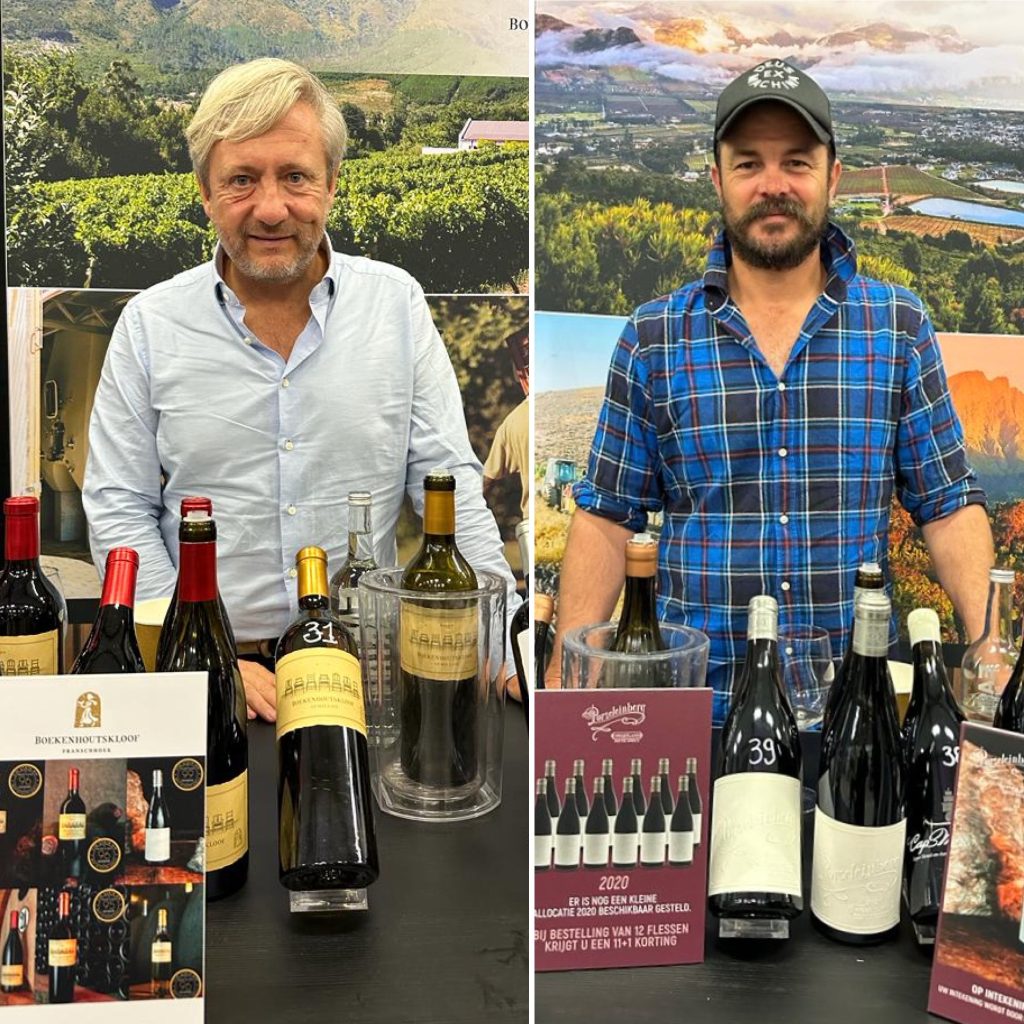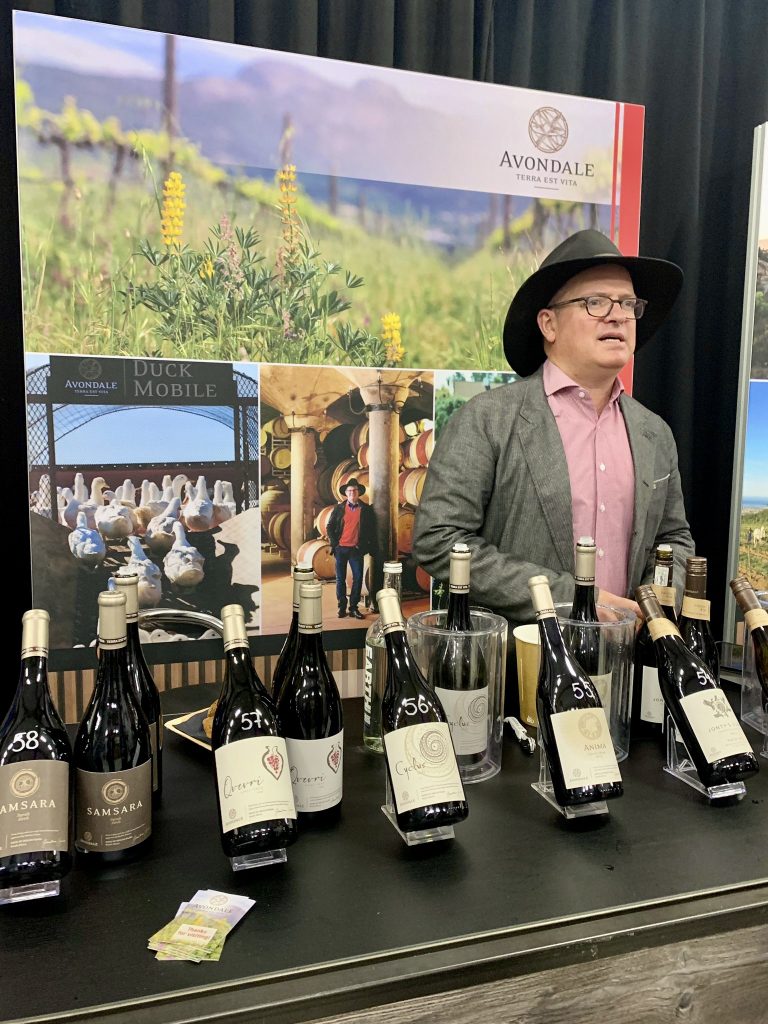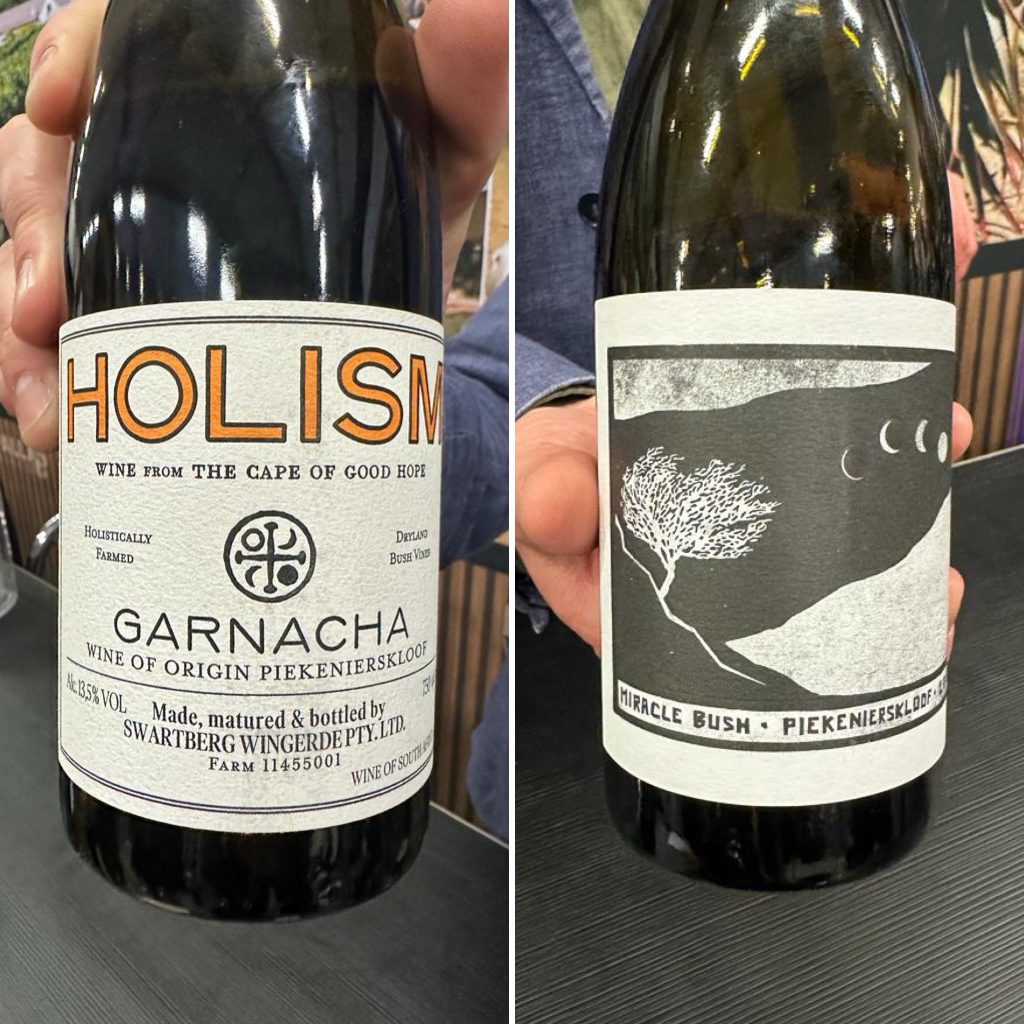South African diversity at the Delta Wines Autumn Tasting.
When leading Dutch wine importer Delta Wines organises a wine tasting you know it is not going to be your average dime a dozen tasting. Tastings by Delta Wines are arranged to perfection and there always is taken care of down to the last detail. The Delta Wines annual autumn tasting our Kazumi and Hermen attended is no exception. This year’s theme is South Africa, no less than eight South African producers are present to inform firsthand about their wines. Add in various masterclasses by the producers themselves and the scene is set for highly informative and satisfying day. We report back to you.
Delta Wines, a Wine to Everyone’s Liking
Delta Wines an international oriented market player and leading Duch wine importer. Delta Wines is a group of seven autonomously operating companies, each with their own focus and expertise. Where Coenecoop for example is focusing on organic and fair-trade wines, Pallas Wines specialises in top quality terroir driven wines. Next to Holland, Delta Wines has companies in Belgium, Finland, Norway Poland and the Czech Republic.
As mentioned this year’s autumn tasting included a special focus on South Africa, with a number of top producers on-site who are distributed by Pallas Wines. So, without further a due let us tell you what we learned and inform you about our finds!
New Generation: Three Passionate Young Winemakers Share their Story
Off the Record
Using a video connection, we have a chat with Bobby Wallace. Bobby is owner and winemaker of a South African winery called ‘Off the Record’. Bobby was intended to become a lawyer, but got the change to buy 25 hectares of vineyards in Elgin. In 2018 he starts vinifying his first barrel of Chenin Blanc and since then he adds a barrel or two every year. Nowadays Off the Record produces two wines: an Elgin grown Chenin Blanc and a Syrah coming from the Ceres Plateau.
Off the Record | Chenin Blanc | 2020
With vines close to the ocean, this maritime grown citrus coloured Chenin Blanc gives a high fruit intensity on the bouquet, combined with cream, green herbs and stone. On the palate it is slightly filling, but the pungent and crackling fresh acids do attract the attention. The wine ends slight creamy with hints of vanilla and nuts. We really enjoy this unique fresh and vibrant style Chenin Blanc. Although the comparison falls short, our thoughts were heading towards Burgundy Chablis. We can see why Bobby Wallace calls this Off the Record Chenin Blanc his ‘smiling’ wine.
We award this Chenin Blanc with a 93-point DWA score (HJ).
Off the Record | Syrah | 2022
The Off the Record Syrah from the mountainous Ceres Plateau was first made in 2020. This transparent ruby coloured Syrah with purple reflections has an earthy and herbaceous bouquet with hints of cinnamon, pepper, violet and black rose. The whole bunch fermentation is expressed by pure bramble and slightly yoghurt like fruit. On the palate the wine offers a nice balance between fruit dominated flavours like soft bramble en blueberry on the one hand and a peppery graphite like structure on the other. Ripe but grippy tannins and sufficient acids do give this enjoyable Syrah a pleasant tension.
We award this Syrah with a 92-point DWA score (HJ).
Tim Hillock Wines
Tim Hillock, owner and winemaker at Tim Hillock Wines, continues. Tim accidentally rolls into winemaking. He studies at Stellenbosch University and gains experience at various wineries. This young an ambitious winemaker produces interesting wines from purchased grapes in a shared boutique cellar in the Swartland Riebeek Valley called Yellowwood Winery.
La Cosmica | Chenin Blanc | 2022
The grapes for the Tim Hillock Wines La Cosmica Chenin Blanc do come from a single vineyard on a steep south-eastern exposed cooler slope at the foot of the Kasteelberg mountain. The soil is predominately schist. Natural fermentation in Foudre and 11 months aging on the lees. The wine we taste is served out of bottle 641 of 2964 and gives ripe – but not overripe – fruit impressions like peach and apricot, together with barrel and lee ripening flavours. One the palate the Cosmica Chenin Blanc 2022 shows a good fruit density with peach and red apple, a round and yeasty texture, elegant acids and an interesting salty underlay.
We award this Chenin Blanc with a 93-point DWA score (HJ).
Paradiso | Syrah | 2022
The grapes for the Tim Hillock Wines Paradiso Syrah come from a single vineyard between Riebeek Kasteel and Malmesbury. The iron-rich soils are cultivated without irrigation, resulting in small perfumed and structured berries. The grapes undergo whole bunch natural fermentation in a concrete tank, followed by 10 months aging in Foudre and old oak barrels. The Paradiso Syrah 2022 by Tim Hillock shows slightly hits of whole bunch influenced dark berries. Dark tinted floral and herbaceous notes like violet, black pepper, clove and graphite however predominate the bouquet. The attack of this young and rebellious Syrah is juicy and blackberry dominated, taken over by banging acids, youthful tannins and a graphite like peppery structure.
We award this Syrah with a 91-point DWA score (HJ).

Porseleinberg – Callie Louw
Porseleinbergs Callie Louw takes over the stage. Baseball cap, lumberjack shirt, unshaven face and a curse every two of three sentences. Although the appearance of Callie Louw is a little rough around the edges, the same cannot be said about his viticultural competences. In 2009 Louw started buying vineyards and grapes for Boekenhoutskloof. Nowadays with Porseleinberg Louw has 90 hectares of vines under his wing. The circumstances are harsh, facing drought and rocky soils. Cultivating the soils has become Callie Louw’s life’s work. Louw: ‘for me it is more important to work on the soil than on the vine. When the soil is not good, the vine never will be good’’.
Porseleinberg is owned by Boekenhoutskloof. Whereas the main part of the grapes from Porseleinberg are destined for wines of Boekenhoutskloof, Callie Louw produces one wine under the label of Porseleinberg: Porseleinberg Syrah. This high end South African Syrah is to be recognized by its stylish pressed white label. Callie Louw: “I don’t know much of design, I know how to drive tractors. When Marc Kent brought me this labelling machine I was hoping he bought me a tractor. Now I know how to drive a labelling machine too’.
To maximise terroir expression, vinification of the Porseleinberg Syrah every vintage follows the same procedure. Whole bunches are spontaneously fermented in foudres and concrete eggs. Since 2018 Callie Louw uses submerged cap for extraction instead of manually pigeage. Louw: ‘it might sound contradictious, but a submerged cap contributes to more extraction, while tannins become softer en more delicate’.
Porseleinberg | Syrah | 2020
2020 was a good year for Porseleinberg Syrah, producing high quality grapes. The Porseleinberg Syrah 2020 gives a wonderful aromatic expression of Syrah with lots of dark fruits like bramble and blueberry, a hint of red fruit like wild raspberry and scents of violet en rose, pepper en dried herbs. The attack is filled with inky concentrated dark fruit like pure bramble and cassis, a rocky stony core, wonderful bearing acids and firm yet rounded tannins. The aftertaste is long with slightly noticeable warming but non-disturbing alcohol. Outstanding wine.
We award this Syrah with a 96-point DWA score (HJ).
Porseleinberg | Syrah | 2021
2021 for Porseleinberg was a cooler vintage. The Porseleinberg Syrah 2021 is young and structured, but already shows its potential. Compared to Porseleinberg Syrah 2020, Porseleinberg Syrah 2021 is slightly closed and dominated by more fresh and floral tones. On the palate the wine is more structured and inkier with a pleasant provocative peppery structure. Although this exciting pure, elegant and concentrated Syrah is packed with firm and powerful tannins, the wine is neither harsh or severe. Powerful concentrated elegance would be descriptive. Outstanding wine.
We award this Syrah with a 96-point DWA score (HJ).

Top Quality – Marc Kent presents Boekenhoutskloof
When it comes to name prominent wine producers in South Africa, you cannot overlook the influence of Marc Kent. His impact spans various aspects of the industry, from his innovative winemaking techniques to consistently delivering high-quality wines, employing distinctive marketing strategies, achieving success in the global market, and leaving his mark on the Swartland region. Boekenhoutskloof, a winery established in the Franschhoek valley in 1776, underwent a renaissance under Marc Kent’s stewardship in 1993.
Since the inaugural vintage at Boekenhoutskloof, his wines have consistently earned recognition as among the best in South Africa. Today, the wines are not only renowned for their quality but also for being vegan-friendly, and the vineyards are either organic or in the process of transitioning. Marc Kent drew inspiration from the Northern Rhône Syrah style, distinct from the New World Shiraz style. His approach aims for elegance and finesse, while also valuing the richness of the mid-palate.
Earlier we already published an article about Boekenhoutskloof and some of their wines, which you can find here, but now let us have a look at some of the wines they brought to the table.
Boekenhoutskloof | Syrah | 2019
A cooler vintage imparts an elegant and lean character to this wine. Partial whole bunch fermentation contributes fruitiness and spiciness, while a slow oxidation process in old wooden foudre enhances integration and depth. The wine boasts blue fruit aromas, accompanied by a medley of spices and herbal notes. It offers a textured experience with supple tannins, lively acidity, and a long finish, showcasing its potential for aging.
We award this Syrah with a 95-point DWA score (KU).
Boekenhoutskloof | Syrah | 2020
In this vintage, approachable black fruits take center stage, accompanied by subdued spiciness and herbal hints. Silky tannins and fresh acidity have seamlessly integrated, making it already an enjoyable wine.
We award this Syrah with a 93-point DWA score (KU).
Boekenhoutskloof | Cabernet Sauvignon Franschhoek | 2018
This wine presents a delicate nose with notes of cassis, blueberry, and green bell pepper. Earthy and savoury flavours blend harmoniously with fine-grained tannins and vibrant acidity, resulting in an elegant and well-balanced profile.
We award this Cabernet Sauvignon with a 94-point DWA score (KU).
Boekenhoutskloof | Cabernet Sauvignon Franschhoek | 2019
Opulence characterizes the nose of this rich and ripe wine, showcasing higher concentration and alcohol content. Aromas of blackberry, dark cherry, classic cassis, and distinct spiciness abound. It boasts high acidity and finely polished tannins, achieving a remarkable balance of power and finesse.
We award this Cabernet Sauvignon with a 95-point DWA score (KU).
Boekenhoutskloof | Cabernet Sauvignon Franschhoek | 2020
The nose is delicate, featuring cassis, blueberry, green bell pepper, chocolate, cocoa, and cigar box notes. While still youthful and austere, it exhibits ripe yet grippy tannins, high acidity, and an elegant texture.
We award this Cabernet Sauvignon with a 94-point DWA score (KU).
Chocolate Block | Syrah, Grenache, Cinsault, Cabernet Sauvignon and Viognier | 2021
This opulent and generous wine greets the senses with black and blue berries and a touch of spiciness on the nose. Fresh acidity and fine-grained tannins provide a well-balanced and integrated backdrop for the abundant fruit flavours.
We award the Chocolate Block with a 90-point DWA score (KU).
Biodynamic the Future – Avondale’s Jonathan Grieve and Reyneke’s Barbara Melck
We went on in a Masterclass on South Africa’s (biodynamical) future, a conversation led by two producers that are well equipped to discuss this topic, Avondale and Reyneke.
Avondale
Talking about striking South African wine personalities Avondale’s Johnathan Grieve has to be mentioned. Grieve has an artistic background and is driven by an almost holistic view on viticulture and vinification. Paarl’s winery Avondale was bought by Grieve in 1996. Back in the days it was a chemical driven winery with little life in the vineyards. In 1999 Grieve produces his first wine and a year later he starts the conversion to biodynamic farming.
Instead of using chemicals and fertilisers Grieve and his team do make their own biodynamic preparates. Legumes, cereals and herbs are planted in the vineyards to promote biodiversity. Grieve: ‘nature is not a monoculture. When I see completely trimmed vineyards I know the wines will be completely out of balance. Sugar levels will rise and the fruit will be tending towards jammy fruit.’ Funny fact is that Avondale has its own ‘duck mobile’. Ducks are picked up en dropped off in te vineyards to control the snails. ‘Nature always has a solution for every problem. Most of the times the solution has to be found in the soil’.
Grieve: ‘Chenin Blanc is like a sponge, it adsorbs its circumstances. We don’t want to ruin that expression by the use of wood. In the quest to maximize the potential of its wines without ruining the expression of the grape and terroir Avondale is not afraid of experimenting unconventional winemaking techniques. Illustrating is the use of skin macerations grapes for its white wines. Grieve: ‘orange wine brings balance, structure and ripeness. To prevent a wine to become too geeky, the maximum amount of orange wine will be 30%’. Another example is the use of clay vessels and clay amphoras. Avondale is the first South African winery to use clay Qvevri.
After this inspiring story it was time for some wines:
Avondale Anima | Chenin Blanc | 2019
This 100% Chenin Blanc is partly fermented in 500 litre French oak barrels and 20% of the grapes is whole bunch fermented on amphora en Qvevri. After fermentation the wine spends 12 months on the lees. This Avondale Anima Chenin Blanc 2019 gives wealthy fruits like melon, peach, apricot and pineapple. On the palate a high fruit intensity reveals together with a salty minerality and succulent acidity. This Avondale Anima Chenin Blanc is a well-balanced wine with dense fruit and a catchy minerality.
We award this Chenin Blanc with a 93-point DWA score (HJ).
Avondale Cyclus | Roussanne, Chenin Blanc, Viognier, Chardonnay & Semillon | 2019
The Avondale Cyclus is unconventional blend of Rousanne (32%), Chenin Blanc (26%), Viognier (21%), Chardonnay (10,5%) and Semillon (10,5%). The grapes are partly fermented in 500 litre Franch oak barrels and 25% is whole bunch fermented on Amphora en Qvevri. After fermentation the wine spends 12 months on the lees. The higher percentage of orange wine results in a deeper colour. The bouquet is flowery, savoury and chalky. On the palate the profile of this wine is determined by the striking linear and elegant acids. From thereon the wine is composed of various layers of intense ripe yellow fruits, spicy notes and a slightly creamy texture.
We award this white blend with a 93-point DWA score (HJ).
Avondale Qvevri | Grenache, Syrah & Mourvèdre | 2021
This blend of 50% Grenache and almost equal parts Syrah en Mourvèdre is (partly whole bunch and party destemmed) fermented in clay Qvevri during 100 days. After fermentation the wine is aged in Qvevri for 12 months. On the bouquet this Avondale Qvevri 2021 gives an interesting combination of expressive fruit and a rustic touch. On the palate succulent crunchy fruit with a lean mineral core. This Avondale Qvevri somewhere reminds of a higher-level Beaujolais and is really fun to drink, especially taking in consideration the low alcohol percentage of 12,5%.
We award this red blend with a 91-point DWA score (HJ).
Avondale La Luna | Cabernet Sauvignon, Merlot, Cabernet Franc, Malbec & Petit Verdot | 2016
The Avondale La Luna 2016 is a Bordeaux blend made out of 48% Cabernet Sauvignon, 35% Merlot, 10% Cabernet Franc, 4% Malbec and 3% Petit Verdot. Post-fermentation the grapes macerate on the skins for 60 days. Malolactic fermentation takes place in 225 litre French oak barrels, first, second and third use. Depending the grapes and blocks the barrels aging on French oak varies from 12 to 18 months. The Avondale La Luna 2016 shows pure black fruits together with a rustic touch. On de palate the full-bodied wine gives a high and dense fruit intensity, mouth filling concentrated black fruits, a soft texture with ripe yet captivating tannins and sufficient balancing freshness.
We award this red blend with a 93-point DWA score (HJ).

Reyneke
Reyneke’s winemaker Barbara Melck is convinced on the necessity of organic and biodynamic farming and is very convincing on that. Melck: ‘organic farming is asked by the market. Biodynamic farming comes from the heart of the producer.’ Reyneke’s vineyards are located close to the city of Stellenbosch. The winery is located on top of the Polkadraai Hills and is overlooking False Bay. In 1998 Johan Reyneke took over the winery from his mother en converted it to organic farming. From thereon Reyneke converts to biodynamic farming. Meck: ‘after the conversion grapes were changing. The taste and flavour of grapes on different plots began to vary more. Due to the biodynamic conversion, Ph levels were decreasing, resulting in more focus and minerality in our wines. We were asking ourselves: is this terroir? In my opinion we might at least speak about micro-biological terroir.’
Melck and her team have taken drastic preventive measures to changing climatological circumstances. Melck: ‘studies show climate in Stellenbosch will get hotter and rainfall will intensify’. ‘We have to get rid of the thought that nature has to adapt to mankind. Our systems are designed to frame and box everything, but nature does not occur in boxes’. To prevent the steep hills to erode, rows are shortened. Between the rows gutters and open areas are created to drain heavy rainfall. Rows are adjusted to let through strong ocean winds. To support biodiversity open spots are created to give nature free hand. In terms of winemaking Melck stand a hands-off approach for, with spontaneous whole bunch fermentations in oak or clay. Merck: ‘I top it off and then leave it alone’.
Reyneke | Biodynamic Chenin Blanc | 2022
Chenin Blanc planted in 1974 and 1976. Spontaneous fermentation in French oak barrels and foudres. 10 months maturation on the lees. On the nose this Reyneke Biodynamic Chenin Blanc 2022 gives fresh and bright fruit expressions like underripe tree fruits and white peach. On the palate the wine is fresh and bright with pure citrus and tree fruits, great acids, a salty savoury layer and great length. Very good wine.
We award this Chenin Blanc with a 94-point DWA score (HJ).
Reyneke | Reserve White Sauvignon Blanc | 2018
100% Sauvignon blanc, spontaneous fermented in French oak barrels (95% new), followed by 12 months of aging in French oak barrels. The Reyneke Reserve White 2018 is extremely expressive, sharp and fresh herbal. On the palate wonderful focus, brightness, great intensity and a savoury minerality occurs. Outstanding wine.
We award this Sauvignon Blanc with a 95-point DWA score (HJ).
Reyneke | Biodynamic Syrah | 2019
The Reyneke Biodynamic Syrah 2019 is a blend of Syrah grapes from various vineyards, with 85% from one vineyard. Spontaneous fermented in concrete tanks, partly destemmed and partly whole bunch. 14 months aging partly in older French casks and partly in stainless steel. The bouquet is perfumed, smoky, spicery and peppery with a hint of clay. The palate is fresh, juicy and exciting spicy with notes of white pepper and dried green herbs.
We award this Syrah with a 93-point DWA score (HJ).
Reyneke | Reserve Red Syrah | 2018
100% Syrah from a single vineyard. Compared to the Reyneke Biodynamic Syrah the French oak barrels for this Reserve Red are younger and the barrel aging takes longer (20 months). The bouquet is quite perfumed and dark, with dark and ripe forest fruit, black pepper and floral notes. The Reyneke Biodynamic Syrah 2018 has an incredible concentration, density and complexity.
We award this Syrah with a 94-point DWA score (HJ).
Swartberg Wingerde
Finally, we are closing the ranks with a winemaker that has earned his stripes in the South African wine scene, but now works under his own label as well. Winemaker Rudiger Gretschel, boasting two decades of experience across various wineries, embarked his own vineyard, Swartberg Wingerde in the Piekenierskloof mountainous region of South Africa. Here, he meticulously crafts limited-production wines that beautifully capture the essence of the terroir. Piekenierskloof, once an overlooked region, is home to venerable old vines.
Holism Palomino | Palomino | 2021
Grapes for this wine hail from old vines, planted in 1964, rooted deeply in the soil and cultivated without irrigation, yielding grapes of concentration. The fermentation process combines the use of Amphora and large oak foudres. The nose is graced with delicate notes of citrus and florals. A palate of fresh acidity and velvety texture leads to a saline finish. It’s a wine that shines with purity, offering depth and texture on the palate.
We award this Palomino with a 91-point DWA score (KU).
Miracle Bush White | 90% Chenin Blanc and 10% Palomino | 2020
The Chenin Blanc vines, planted in 2003, contribute to this wine’s aromatic profile, which features white peach, floral, and subtle herbal nuances on the nose. Its refreshing character is complemented by vibrant acidity and a textured finish.
We award this Chenin Blanc with a 89-point DWA score (KU).
Holism Garnacha | Grenache Noir | 2021
This wine emanates bright notes of strawberry, raspberry, and red cherry at its core. The palate showcases earthy and savoury undertones, adding complexity away from the fruit-forward wine. It finds structure in its lively acidity and silky tannins, resulting in a harmonious and well-balanced expression.
We award this Garnacha with a 92-point DWA score (KU).
Miracle Bush Red | Syrah, Grenache Noir, Pinotage | 2019
The nose of this wine reveals an array of red berries, violets, and a medley of spices. It offers a refreshing acidity and an ample mid-palate that delights with its texture and depth.
We award this red blend with a 90-point DWA score (KU).
Sangiro Old Vine Pinotage | 2017
The precious old vines, planted in 1990 within a limited 3.4-hectare vineyard, impart their character to this wine. It exudes pure red plum and berry notes, accompanied by a tapestry of oriental spices like cardamom, anise, and nutmeg. The wine’s bright acidity and silky tannins provide structure while maintaining a remarkable elegance.
We award this Pinotage with a 92-point DWA score (KU).

Conclusion
Delta Wines succeeded to give an extensive overview and impressive impression on the great diversity of South African wines. The variation in climates, terroir and winemaking visions do result in countless variations in South African wine styles. We quote: Callie Louw: the is a prejudice South African wines are all the same. The tasting showed these times are far behind us. The wines we tasted prove the quality bar of South African is set high. Even more important and promising is the will of South African wine producers to improve further. We have seen and felt an intrinsic motivation of continuously improvement. The quest to adapt to changing circumstances is hard and goes step by step, but we think will to cooperate and exchange knowledge en experiences will result in even more responsible and sustainable high quality South African wines.
We would like to thank Delta Wines and the Pallas Wines team for their hospitality and this great event. And of course, the winemakers who took the effort to come over to the Netherlands, sharing their great wines and stories. All wineries and wines discussed in this article are available through selected resell and hospitality partners of Delta Wines.
This event is covered by our own Kazumi Uejo and Hermen Jansen.

